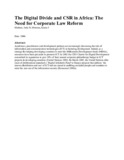| dc.contributor.author | Muthuri, Judy N | |
| dc.contributor.author | Mwaura, Kiarie J | |
| dc.date.accessioned | 2013-07-11T11:53:46Z | |
| dc.date.available | 2013-07-11T11:53:46Z | |
| dc.date.issued | 2006 | |
| dc.identifier.citation | Corporate Citizenship in Africa: Lessons from the Past; Paths to the Future, 10 July 2006 , pp. 201-210 | en |
| dc.identifier.uri | http://erepository.uonbi.ac.ke:8080/xmlui/handle/123456789/47433 | |
| dc.description.abstract | Academics, practitioners and development partners are increasingly discussing the role of information and communication technologies (ICT) in fostering development. Indeed, as a strategy for helping developing countries to meet the Millennium Development Goals (MDGs), resources have been put aside to promote ICT. In 2002 the CEO Charter for Digital Development committed its signatories to give 20% of their annual corporate philanthropy budget to ICT projects in developing countries (United Nations 2002). In March 2005, the United Nations after years of deliberations launched a `Digital Solidarity Fund' to finance projects that address `the uneven distribution and use' of ICT and are aimed at enabling excluded people and countries to enter the new era of the information society (Economist 2005a) | en |
| dc.language.iso | en | en |
| dc.publisher | University of Nairobi, | en |
| dc.title | The Digital Divide and CSR in Africa: The Need for Corporate Law Reform | en |
| dc.type | Article | en |
| local.publisher | Department of Commercial Law | en |

